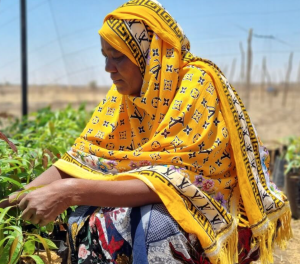Women have limited access to and control over productive resources like land and capital. Only 8 per cent of women in the country own land independently, and only 4.1 per cent of land has a woman’s name on the title. Because of discriminatory norms, only men traditionally inherit land. This means women are often only able to farm their spouse’s land—or rent land, with limited access to capital and no collateral to access loans. This inadequate access to financing further impacts their ability to purchase the tools and other necessary resources, such as seeds and fertilizer.
Climate change, reflected in changing weather patterns and decreasing crop yields across the country, is already taking a toll on Tanzania’s agricultural sector. It is also deepening inequalities within the sector: women are less likely to have access to the knowledge and technology they need to build their resilience against these shocks.
In the face of these challenges, women from Mariam’s district decided to join forces. They organized themselves into producers groups, pooling their resources to cultivate larger pieces of land and farm sunflowers—the most profitable crop farmed in that region. By selling their crops as a collective, the women have been able to attract larger customers.
In 2020, Mariam joined one of the producers groups. That same year, as part of the UN Women and UNFPA joint programme “Realizing Gender Equality through Empowering Women and Adolescent Girls”, UN Women partnered with Farm Africa to build the capacity of her group, along with 15 other women’s producer groups in surrounding villages, on modern, climate-smart agricultural practices. The women received training on drip irrigation, methods for better water management, and sustainable strategies to improve the productivity of sunflower farming
They were also given hybrid sunflower seeds, which are more resilient to climate change, and linked with agricultural marketing cooperatives to enhance their access to markets. Through a warehouse constructed under the programme, they will also be able to store their crops longer and boost post-harvest sales.
